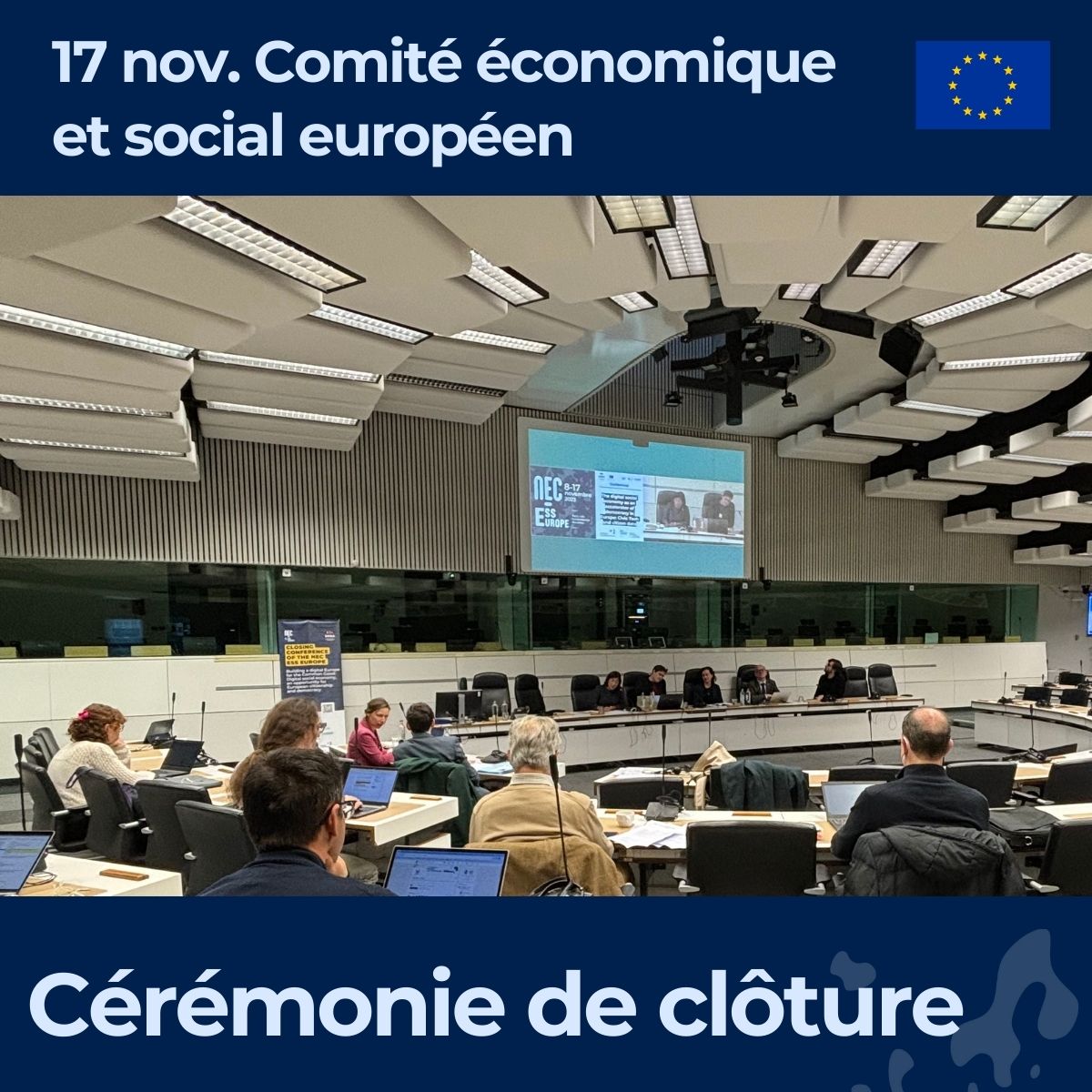Digital Social Economy:
an opportunity for European citizenship and democracy
17 November 2023 marks the end of NEC ESS Europe, the meeting of the digital Social Economy in France and Europe, organised by SOGA. Its objective? To promote and accelerate digital Social Economy. This event is part of ANCT’s Numérique en commun[s] initiative and is co-funded by Crédit Coopératif. With over 200 participants and more than 80 speakers, the NEC ESS Europe was the catalyst for some fascinating discussions. Here is a report on the discussions at the conference ‘Building a digital Europe for the common good: Digital Social Economy, an opportunity for European citizenship and democracy’, which took place in European Economic and Social Committee.

We were delighted to welcome Gabriela Martin, Vice (President of SOGA); Adrien Duguet (President of ACTE); Hendrik Nahr (Head of European Affairs at Make. org); Giuseppe Guerini (President of CECOP-CICOPA Europe – EESC); Julia Herriot (Project Manager, Digital Society Programme, Agence Nationale de Cohésion des Territoires, France); Jeanne Bretécher (President of the Social Good Accelerator); Sarah de Heusch (Director Social Economy Europe); Patrick Klein (Head of Sector – European Commission – Social Economy); Denis Stokkink (President of Pour La Solidarité); Maxime Baduel (Délégué Interministériel à l’ESS – French Government).
The digital Social Economy as a driver of democracy in Europe
The first conference highlighted the role of the digital social economy as a driver of democracy in Europe, focusing on civic tech and citizen data. Gabriela Martin (SOGA) opened the debate by stressing the need to create open and inclusive digital spaces. She cited European citizen consultation projects that use civic tech platforms to facilitate public engagement on social and political issues.
Julia Herriot (ANCT) explained the approach of Numérique en commun[s] and that of the ANCT’s Digital Society Programme.
“Our aim is to highlight the potential and challenges of the digital SE for the digital, democratic and ecological transitions, in particular the issues of funding and data of general interest”.
Jeanne Bretécher (SOGA) stressed the importance of digitising the social economy to support democracy and social services, mentioning innovative digital platforms that facilitate citizen participation.
Adrien Duguet (ACTE) addressed the crucial issue of integrating technology into democratic processes. He stressed the importance of maintaining transparency and protecting personal data, two essential pillars for maintaining trust in democratic systems in the digital age. Adrien Duguet stressed the need to adopt technological solutions that not only facilitate citizen participation, but also guarantee the confidentiality and security of voter information, avoiding any form of data manipulation or abuse.
Hendrik Nahr (Make.org) illustrated the impact of digital tools on citizen participation with concrete examples from his experience with Make.org. One notable example is the EurHOPE campaign, an initiative to encourage and mobilise young European citizens ahead of the 2024 elections. The campaign uses digital platforms to engage young people in political debate, allowing them to share their opinions, vote on important issues and actively contribute to shaping the political agenda. EurHOPE aims to give young people a voice in the political process and strengthen their civic engagement, using technology as a means to effectively reach and engage this often under-represented age group.
Giuseppe Guerini (EESC, CECOP) spoke about the importance of regulating digital technologies at European level, arguing for an approach that protects citizens while encouraging innovation. He also said:
“It is crucial to develop European regulation in the digital sector, while allowing a significant role for the social economy in this process.”
The role of digital services of general interest and public-private partnerships with social economy actors as guarantors of European social and territorial cohesion
This session explored the role of digital services of general interest and public-private partnerships in European social and territorial cohesion. Jeanne Bretécher (SOGA) introduced the conference by reaffirming the “superpower” of the social economy: cooperation.
Sara de Heusch (Social Economy Europe) spoke about the influence of the social economy in redefining the digital world. Her speech focused on the importance of preserving democratic and community values in the rapid development of the digital sector. She emphasised that social economy entities such as cooperatives, mutual societies, associations and foundations have a unique role to play in creating a digital space that respects individual privacy, promotes environmental concerns and encourages participatory and democratic governance. By promoting these principles, the social economy can offer an alternative model for a fairer and more sustainable digital world, in contrast to current models that are often dominated by the profit motive.
Patrick Klein (European Commission) stressed the need for co-creation and partnerships between different sectors for an effective digital transition, reflecting the European Union’s commitment to these initiatives.
“It’s important to remember that in the European Action Plan for the Social Economy, we put a lot of emphasis on the digital transition, particularly in the area of green spaces and of course working with stakeholders for the digital condition (…) I think the first important thing is the co-creation process.”
Denis Stokkink (Pour La Solidarité) presented the “Social Tech Academy” project, supported by SOGA, Egina and Fundacion Esplai. This innovative project aims to develop specific digital skills for the social economy sector through a resource platform and a learning trip that will take place next January.
Maxime Baduel (French Minister for the Social Economy) discussed the challenges of the digital transition in the social economy, focusing on data management and the development of digital skills, highlighting French efforts in this area. He also highlighted the importance of the role of the state in developing the digital social economy at European level:
“If we can maximise the development potential of the social economy in the coming years, our continent will be stronger and more resilient. That’s why digital services must help to create all these conditions, with both the digital revolution and the social economy on the move. We need to make digital businesses and services more accountable through democratic, fair and sovereign models”.
You can watch the replay on the Social Good Accelerator YouTube channel.
If you are interested in these issues, join SOGA to support us and develop a strong European digital Social Economy.
